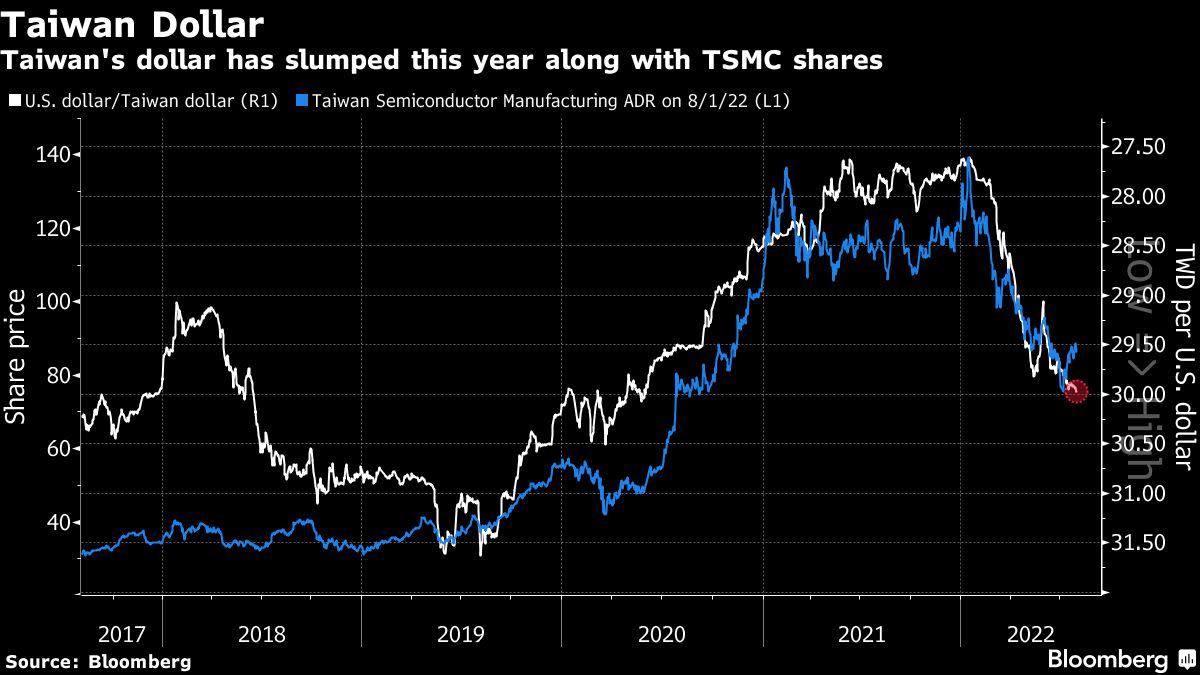Pelosi’s Taiwan Trip Raises Angst in Global Financial Markets

(Bloomberg) — Traders are bracing for US House Speaker Nancy Pelosi’s expected arrival in Taipei Tuesday to raise tensions with China, with stocks sliding and global havens the yen and Treasuries climbing.
Most Read from Bloomberg
Taiwan’s benchmark stock index fell as much as 2.1%, Hong Kong and Chinese shares slumped, while the Japanese currency touched a two-month high. Ten-year Treasury yields dropped for a fifth day and approached 2.5%, a level last seen in April. The Taiwan dollar hit its lowest since May 2020.
Pelosi’s trip is creating a fresh pressure point for investors already dealing with the prospects of a US recession, worldwide rate hikes and surging inflation. Tuesday’s moves suggest traders are hedging against tension escalating, with analysts warning of the tailrisk of a conflict between the world’s two largest economies that wreaks havoc on global markets.
“Some economic response against Taiwan is inevitable, otherwise the loss of face for China after all the threats would be unbearable,” said Alvin Tan, head of Asia currency strategy at RBC Capital Markets in Singapore. “Risk appetite will remain cautious, with the greatest anxiety focused on Greater China markets, but beyond that, we would need to see the specific reaction from China.”
China regards Taiwan as part of its territory and has promised “grave consequences” for what would be the highest-ranking US official to set foot on the island in 25 years. Taiwan is a critical supplier of semiconductors and other high-tech goods.
Some are warning the consequences could ripple. The concern is that the trip and China’s reaction to it worsens the longer-term relationship on trade, and plays out in markets over weeks or more, with implications for Treasuries, according to BMO’s Capital Markets strategists Ian Lynge and Benjamin Jeffery. Yields on the 10-year benchmark may well breach 2.5% this week, they wrote in a report.
Biden Team Tries to Blunt China Rage as Pelosi Heads for Taiwan
The White House has sought to dial back rising tensions, insisting there was no change in position toward Taiwan and urging Beijing to refrain from an aggressive response. The US has outlined an analysis of the possible actions China could take, including firing missiles into the Taiwan Strait, launching new military operations, and crossing an unofficial no-fly zone between Taiwan and the mainland.
One-month risk-reversals on the dollar-Taiwan dollar — a gauge of expected direction over that time frame — have jumped to the highest since May, signaling traders are betting the island’s currency will weaken.
Despite the tensions, global risk assets have been relatively resilient. China’s offshore yuan was little changed Tuesday. S&P 500 futures retreated just 0.4%.
“Expectation is that China’s reaction will mostly confined with some signaling actions, instead of something really hurting their economy, and therefore at this stage, we view the market’s reaction has so far been relatively mild,” Becky Liu, head of China macro strategy at Standard Chartered Bank Plc, told Bloomberg Radio. “We just need to be concerned about the medium-to long-term implications.”
Chinese Stocks Tumble on Geopolitical Risks, Growth Concerns
Taiwan Semiconductor Manufacturing Co., the world’s largest chipmaker, fell as much as 3.1%. The stock have fallen about 20% this year with Taiwan’s stock benchmark down about 19%, slightly worse than the 17% decline in the MSIC AC Asia Pacific index.
Pelosi may land in Taipei as soon as Tuesday, according to people familiar with the matter. Her trip comes after a decades-long record of pushing back against China for its human-rights record and growing global clout. As House Speaker she’s second in line of succession to the US presidency, making her visit to the democratically-ruled island an affront to Beijing.
Pelosi’s Taiwan Trip Hits China Stocks, Boosts USTs: Street Wrap
Still, investors may need to prepare for a drawn out reaction in financial markets, something which could underpin haven assets like Treasuries.
“Pelosi’s visit carries with it the presumption of a limited timeframe for a tradable response; an assumption that we’ll characterize as misplaced,” BMO’s Lynge and Jeffery wrote in a note. “Any response could be weeks away or further and for this reason we anticipate that the geopolitical backdrop will once again contribute to the bullish underpinnings for the US rates market.”
(Updates throughout)
Most Read from Bloomberg Businessweek
©2022 Bloomberg L.P.




